Fear the Power of Women’s Anger: Polish #strajkkobiet Tells the Government to ‘Fuck Off’
by: Anna Misiak with Magdalena Tymicka , October 27, 2020
by: Anna Misiak with Magdalena Tymicka , October 27, 2020
Every fan of Game of Thrones knows it: when a smart woman feels disrespected or oppressed, she gets angry and then she flies a dragon and then it all goes up in flames. Well, the global TV show was indeed quite popular in Poland too, but some of the country’s lawyers and politicians must have been too busy when HBO aired the last season. And so, a while later, they’ve exposed themselves to the anger of women…
The story starts on 22nd October 2020, when the Constitutional Tribunal in Poland declared that any termination of pregnancy due to foetal genetic defects or other deformations of an embryo should be illegal. Amid the global pandemic, this somewhat unexpected decision prompted an unprecedented, fierce mass action by Polish women from all walks of life.
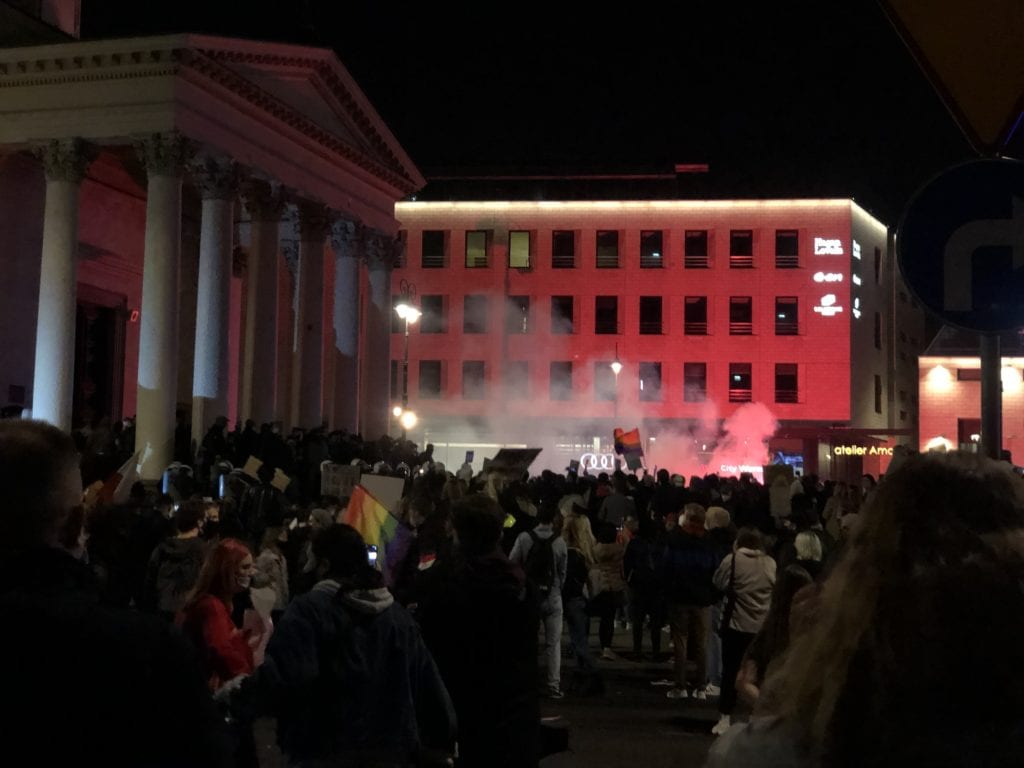
Not budging an inch for more than six days now, Polish women have gone on strike, organised street protests, picketed Churches and government buildings. Now many of them also speak about ‘revolution’ or ‘war’ with the government. United in this impromptu emergency feminist operation, they have staged one of the largest female demonstrations of political discontent, not only in the recent history of their country but most likely also in the history of the European Union.
Although women lead these protests in resistance against the draconian decision of the Tribunal, they are not alone. The extreme pro-life pronouncement also mobilised men, who stand by the women across the whole country in brave, admirable acts of civil disobedience.
First, these rallies are to defend women’s rights by stopping the recent prohibitive ruling from becoming the law, which thankfully has not happened yet. Secondly, there is growing hope that the demonstrations will shake off the power of PiS—the governing right-wing party, who according to the opposition have already fallen into disrepute for past manipulations of the legal system and many self-righteous, authoritarian political decisions.
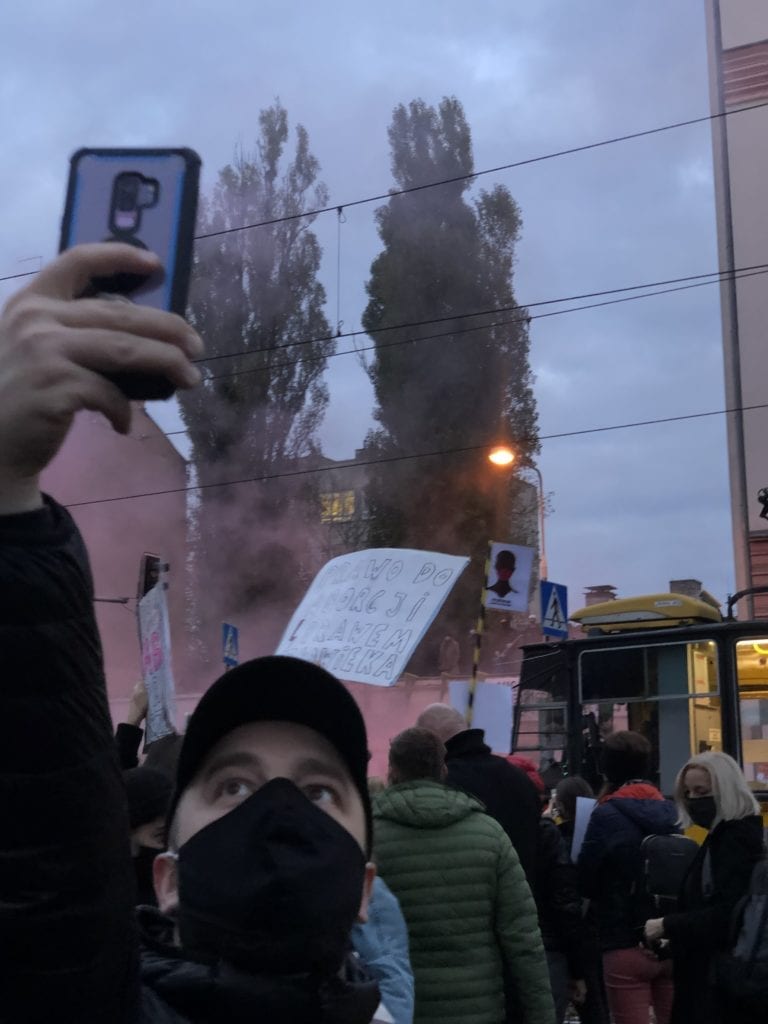
From abroad, the current protests of angry women are often mistaken for rallies against the abortion ban. However, even though many protesters might be pro-choice or pro-abortion, some are just objecting to the recent restriction as ‘barbaric’, even if they don’t oppose the abortion ban in general.
Abortion has been illegal in Poland since the 1990s. Yet, the 1993 Act, which today is still the law, allows for termination in case of rape, incest or foetal pathology. And, it was the latter that some extreme pro-life circles classified as ‘eugenics’—an interpretation that had been used before in Polish parliament to propose laws to tighten one of the already most strict abortion laws in Europe. To date, several such proposals had been unsuccessful. That is until last Thursday when the Parliament (Sejm) was bypassed and a higher instance institution, the Constitutional Tribunal honoured the pro-life proposal to toughen up the law.
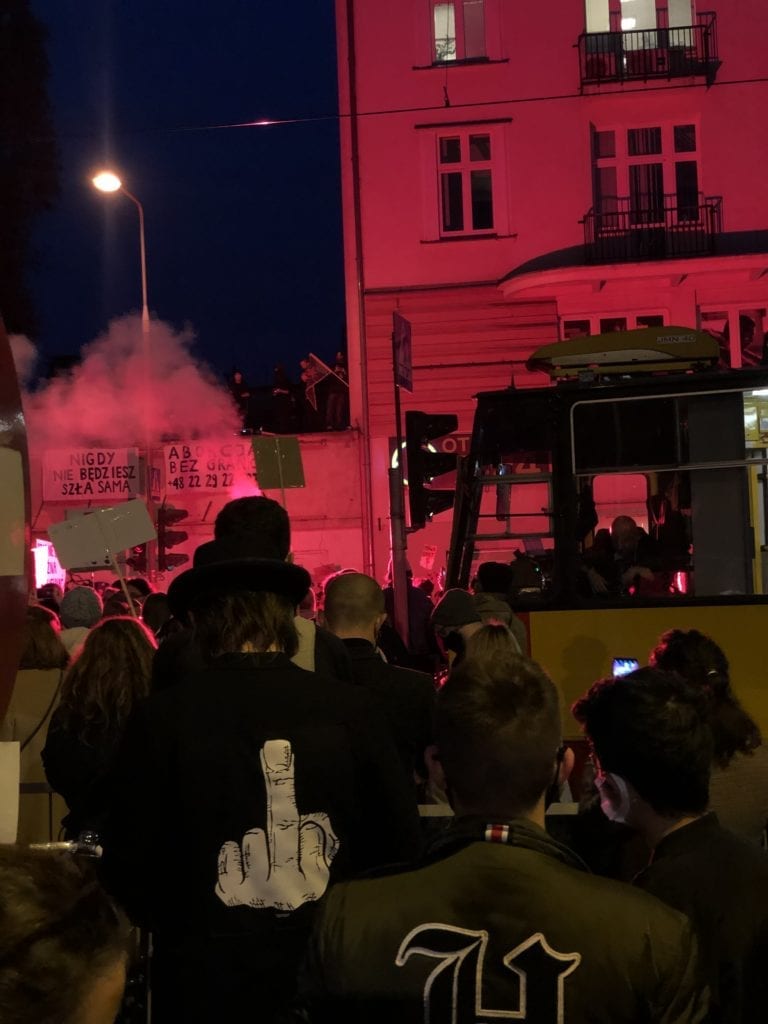
The Tribunal consisting of nine members, including two women, responded to a petition signed by 107 right-wing MPs. They contested termination in case of foetal pathology as unconstitutional. It may come as a surprise that one of the most eager campaigners in favour of such a ruling was a woman—Kaja Godek, a mother of two children, one of whom has Down’s syndrome.
Despite her pro-life arguments and her personal investment in the cause, Godek has not won widespread sympathy for her campaign. Immediately, after the Tribunal ruling, she became one of the villains in the story. Her urge to save the unborn children was seen as a severe attack not only on women’s rights to control their bodies but also on the rights of everyone to have a happy and healthy family.
Users of social media, such as Instagram, Facebook and Tik Tok, flooded their profiles with political activism. They often cited testimonies from parents of children with genetic defects, diseases and disabilities, including Down’s syndrome. Many of such posts consisted of reports filled with the misery of being left alone by the government—stories of an unbearable burden shared by mothers and fathers of such children. They simply proved that the intentions of the political elites to save the unborn could translate into severe effects on the lives of women and their families.
For many, such stories have revealed that the government barely ever supported parents of disabled children. They also illustrated that the Tribunal’s recent ruling was no more than a ruthless disregard for women’s power to decide their fate. It could compromise many women’s health and well-being and condemn whole families to destruction in the name of ideology. Once again, the lawmakers in the country have shown that to them women were not loving human beings who were capable of being in charge of their bodies and their ethical choices. It has become evident that the pro-life movement and its supporters from the political elites treated them as evil humans, potentially heartless killers of babies who should be saved from themselves. Even for the religious Poles, that was one step too far.
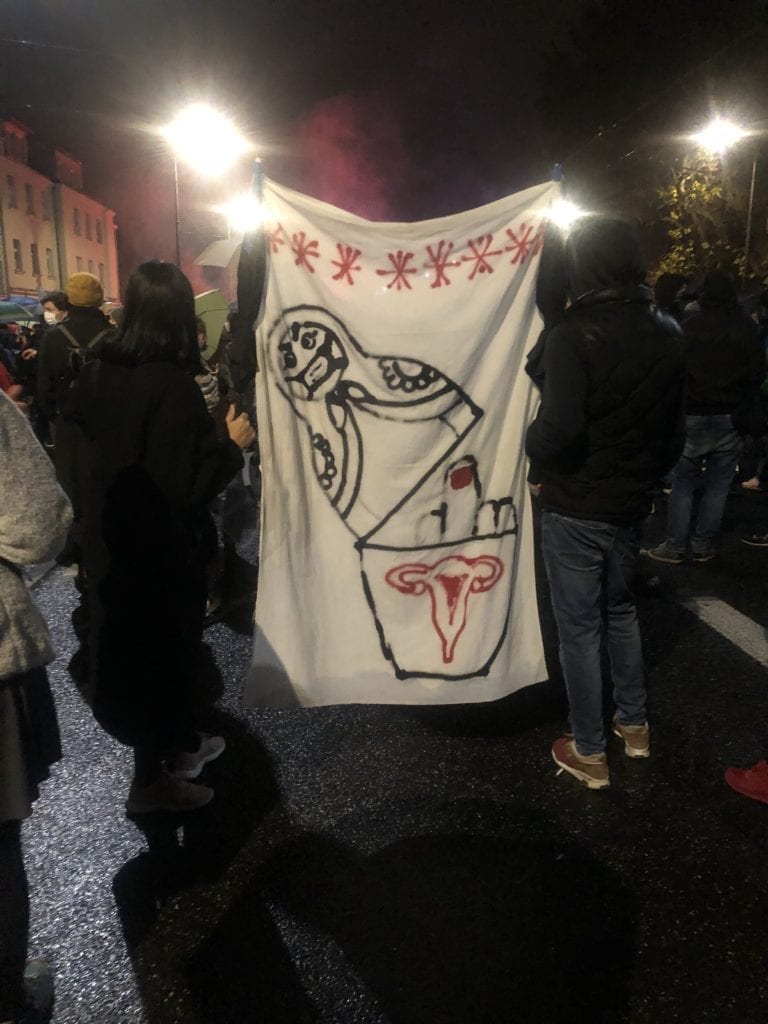
Dubbed as the Women’s Strike (Strajk Kobiet), the grassroots protests gain in force every day. Although the decision of the Tribunal doesn’t have legal power as yet, the activists demand immediate concessions from the government. The women at the frontline are not afraid of the pandemic or the police, even if they are sometimes treated with tear gas or threatened by rumours of the government sending an army to pacify them.
The energy of Polish women who stand up for their right to control their bodies and the nation’s solidarity with these angry women—who, on 26th October, brought all traffic in many metropolitan areas to a halt—is inspiring on a global scale—especially given the power of Catholicism in Poland.
Until now, religion has rarely been contested in public debates in Poland. However, last weekend the association of the extreme pro-life movement with the Catholic Church, which has been supported by the ruling party, catalysed women to stage walk-ins during Sunday masses. There have also been frequent reports about political graffiti on the walls of Churches in the main cities.
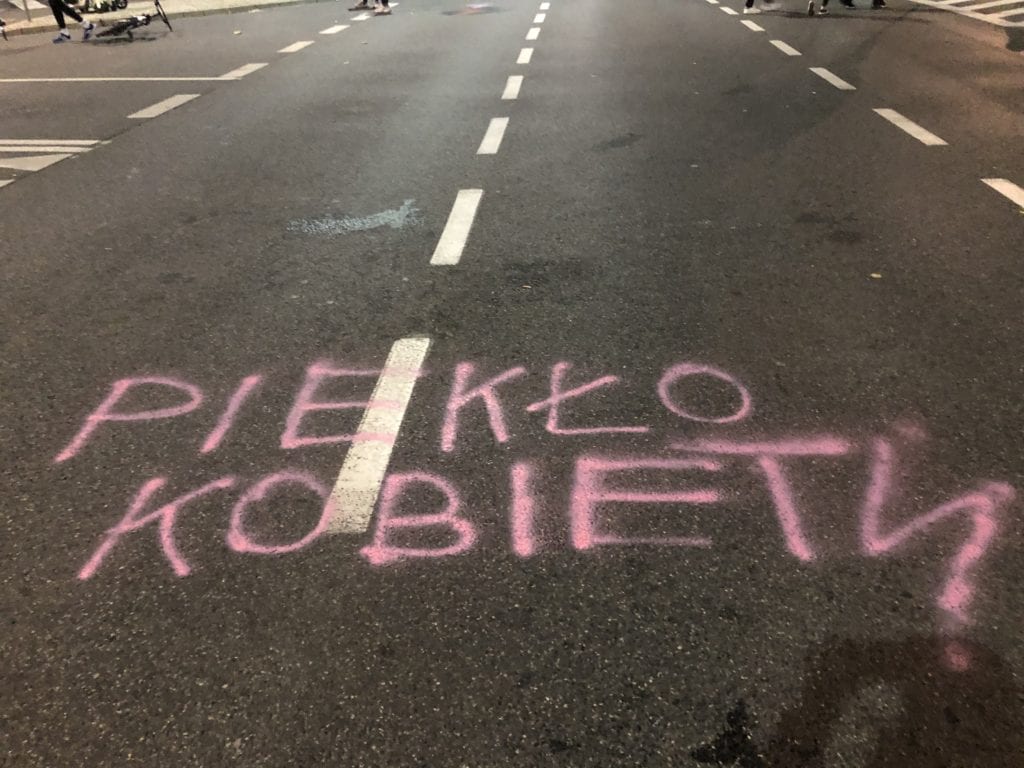
Being under extreme pressure and pushed to the edge, Polish women realised that polite negotiation is out of the question now. They have lived with the abortion ban and religious gender politics for many years now. Many have learned to manoeuvre and negotiate the system of traditional gender expectations in their own way, while avoiding being labelled as ‘feminist’ so as not to cause any unease socially.
However, now this time of crisis precipitated a different female reaction. When the government goes too far (and previous protests and resistance fell on deaf ears), the time comes to resist this political hegemony with anger and street marches.
To the surprise of many conservative men, this time the mythical heroic Polish mothers refused to sacrifice themselves. They turned into sorceresses that shout, scream and refuse to yield. Many ‘nice’ girls started using vulgar and violent language and united with male companions under ‘FUCK OFF’ (‘WYPIERDALAĆ) banners (that are sometimes stylised to mimic the famous Solidarity logo from the 1980s).
Long live the feminist spirit of Polish women, even if we know some of them don’t want to be labelled as such. They are, and long will be, the new role models for the global feminist movement: proof that we shouldn’t hesitate to be militant to protect our rights to control our own bodies.
***
At MAI, we stand in solidarity with Polish women. We admire their courage and resilience, and we hope that the ruling party in their country will ‘fuck off’ or at least won’t ratify that monstrous, inhumane decision from 22nd October 2020.
The dominant English-language media do not seem to be too keen to make this story their headline. Yes, we get it: angry women don’t satisfy the patriarchal eye. But maybe with more global noise, the Polish government will fuck off one way or another. So, let’s talk about #strajkkobiet.

WHO SUPPORTS US
The team of MAI supporters and contributors is always expanding. We’re honoured to have a specialist collective of editors, whose enthusiasm & talent gave birth to MAI.
However, to turn our MAI dream into reality, we also relied on assistance from high-quality experts in web design, development and photography. Here we’d like to acknowledge their hard work and commitment to the feminist cause. Our feminist ‘thank you’ goes to:
Dots+Circles – a digital agency determined to make a difference, who’ve designed and built our MAI website. Their continuous support became a digital catalyst to our idealistic project.
Guy Martin – an award-winning and widely published British photographer who’s kindly agreed to share his images with our readers
Chandler Jernigan – a talented young American photographer whose portraits hugely enriched the visuals of MAI website
Matt Gillespie – a gifted professional British photographer who with no hesitation gave us permission to use some of his work
Julia Carbonell – an emerging Spanish photographer whose sharp outlook at contemporary women grasped our feminist attention
Ana Pedreira – a self-taught Portuguese photographer whose imagery from women protests beams with feminist aura
And other photographers whose images have been reproduced here: Cezanne Ali, Les Anderson, Mike Wilson, Annie Spratt, Cristian Newman, Peter Hershey
